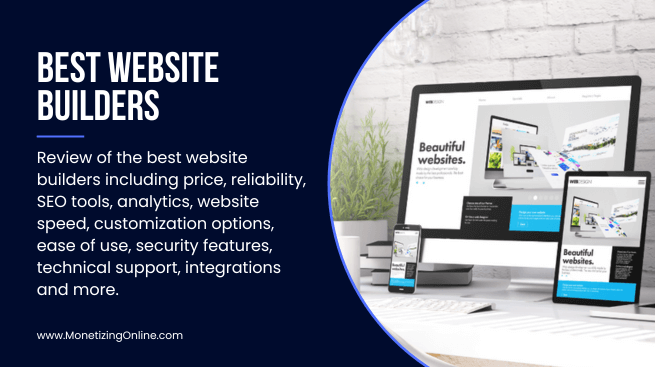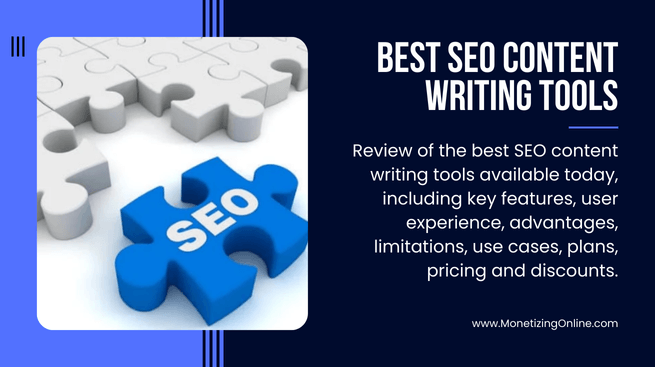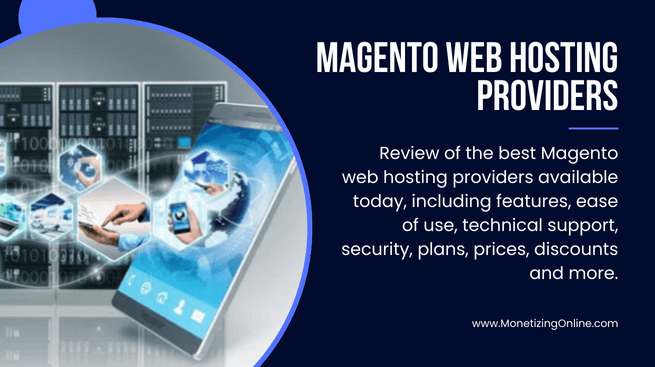Ecommerce Website Builder Companies: 11 Best Picks Compared
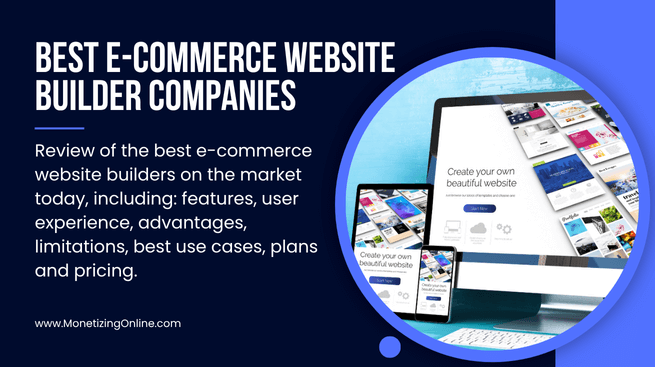
Choosing the right ecommerce website builder companies is more crucial than ever.
With over 2.77 billion people now shopping online and global e-commerce sales expected to surpass $6.86 trillion this year, there’s no room for error.
But since there are hundreds of options promising fast setup, sleek design, and powerful sales tools, it’s easy to get overwhelmed.
The wrong web store builder however, can cost you time, money, and missed opportunities.
From hidden fees and clunky interfaces to limited design options and poor scalability, many platforms promise more than they deliver.
So, in this guide, I’ve cut through the noise to highlight the best ecommerce website builders that offer the right balance of features, flexibility, value and performance.
Let’s dive into the top players that are shaping the future of online selling.
Disclaimer: This article contains affiliate links. If you sign up for a paid plan through my links, I may receive small compensation at no cost to you. You can read my affiliate disclosure by going to my privacy policy. This blog is for informational purposes only and does not constitute financial advice.
Best Ecommerce Website Builder Companies
Below I’ve compiled a list of best ecommerce website builder companies to help you find the perfect platform that matches your business goals, budget, and technical comfort level.
1. Shopify – best overall e-commerce platform
2. Wix – best for beginners and small businesses
3. Squarespace – best for visually rich product stores
4. Hostinger – best for simple and fast store setup
5. Sellfy – best for digital product creators
6. Webflow – best for web designers who want full control
7. ShopWired – best for UK-bases online stores
8. GoDaddy – best for fast, code-free ecommerce setup
9. Volusion – best for mid-sized online shops
10. PrestaShop – best for European stores
11. Ecwid – best for adding a shop to an existing website
Conclusion
Frequently Asked Questions
Recommended Articles
Whether you’re selling physical products, digital downloads, or subscriptions, my list will help you find the best platform that supports your growth, instead of slow it down.
1. Shopify
Best Ecommerce Website Builder Company ($19/Month)
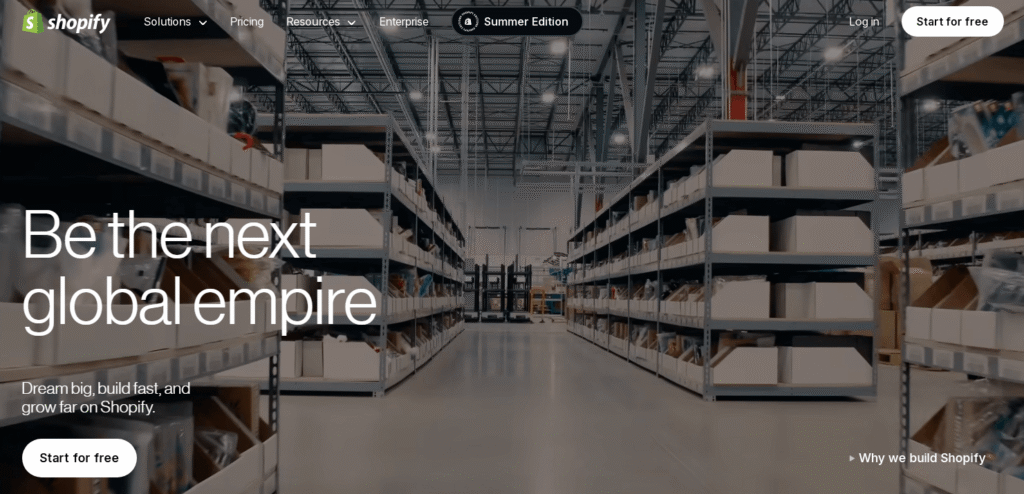
Company Overview
Shopify is one of the most recognized and widely used ecommerce website builder companies in the world, known for helping businesses of all sizes launch, manage, and scale their online stores with ease.
Founded in 2006 in Ottawa, Canada, by Tobias Lütke, Daniel Weinand, and Scott Lake, it was originally created as a solution to sell snowboards online.
Frustrated by the lack of effective e-commerce platforms at the time, the founders decided to build their own and that simple idea has since evolved into a global commerce powerhouse.
Today, Shopify powers millions of businesses across more than 175 countries, with users including brands like Allbirds, Gymshark, and Kylie Cosmetics.
It powers over 5.6 million active stores, and according to company data, its merchants have generated over $900 billion in total sales since the platform’s inception.
Key Features
Shopify is feature-rich platform designed to grow with your business from launching your first product to scaling a global brand.
- Drag-and-drop store builder with no coding required.
- Customizable themes (100+ options, both free and premium).
- Mobile-responsive design by default.
- Has the best inventory tracking and management among the ecommerce website builder companies.
- Supports 100+ third-party payment gateways (PayPal, Stripe, Apple Pay, etc.) as well as Shopify Payments (built-in payment processor with no extra transaction fees).
- One-click checkout options like Shop Pay and Apple Pay.
- Secure checkout (Level 1 PCI DSS compliance).
- Discount codes and automatic promotions.
- Real-time carrier shipping rates (UPS, FedEx, DHL, etc.) and built-in shipping labels and printing.
- Dropshipping integration such as Oberlo, DSers, Spocket.
- 24/7 customer support (chat, email, phone).
- 98% uptime and reliable global infrastructure.
User Experience

Shopify’s dashboard is intuitive and beginner-friendly, making it simple to manage everything from product listings, inventory orders, to customer details, and analytics.
You can get a store up and running in no time.
I didn’t need to touch a line of code, yet I was able to create a professional-looking website using their selection of beautifully designed themes.
Adding variants, organizing collections, and syncing inventory across channels is effortless.
Unlike some ecommerce website builder companies, Shopify streamlines multichannel selling.
I could integrate with Instagram, Facebook, Amazon, and TikTok in just a few clicks, and all the orders synced back into one central dashboard.
With Shopify Payments already built-in, accepting credit cards, Apple Pay, and Shop Pay is seamless.
The abandoned cart recovery feature helped me win back potential customers without lifting a finger.
Overall, the platform is stable and fast, and the customer support has been responsive every time I’ve reached out.
Advantages
Where Shopify really shines is in its balance of simplicity and power.
- All-in-one approach, on a fully hosted, scalable platform, including website creation, customizable themes, built-in payment processing and seamless multi-channel selling.
- Unlimited products and categories, including product variants (size, color, material, etc.).
- Extensive ecosystem with 8,000+ apps.
Limitations
Here are Shopify’s limitations compared to other ecommerce website builder companies, based on both platform capabilities and user experience.
- Only a handful of free themes, and while premium ones are high-quality and customizable, they come at an additional cost.
- Despite Shopify being beginner-friendly, deep, advanced customization requires knowledge of Liquid, Shopify’s proprietary templating language.
Pricing & Plans
Shopify offers 25% off when you subscribe for a yearly plan.
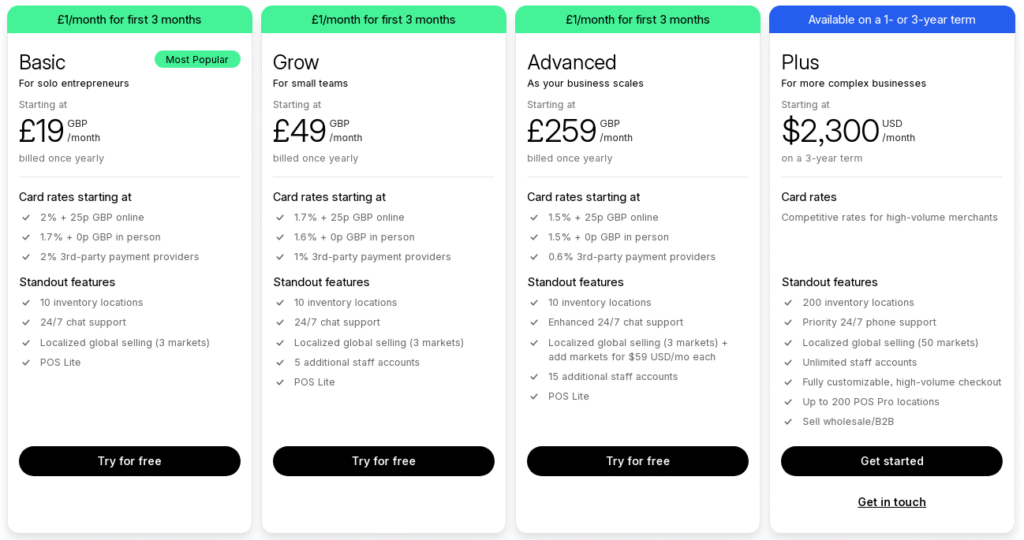
Basic
Price: $19/month
Saving: 25%
- Features: Unlimited products, unlimited bandwidth, 10 inventory, free SSL, locations, analytics, localized global selling (3 markets), POS Lite, unlimited web hosting, custom domain, Shopify email, discount codes, gift cards, marketing automation, abandoned checkout recovery, 2% third party transaction fees, ecommerce automations, access to template/themes currency conversion, access to template/themes and 24/7 chat support.
- Best for: new sellers or smaller online shops.
Grow
Price: $49/month
Saving: 25%
- Features: everything in the Basic plan as well as 1% third party transaction fees, 5 additional staff accounts, full data access to custom apps.
- Best for: growing e-commerce businesses.
Advanced
Price: $259/month
Saving: 25%
- Features: all tools included in the Grow plan plus 15 accounts, 0.6% third party transaction fees, up to 2x on select APIs, local storefronts, duties and import taxes calculation at checkout, and enhanced 24/7 live chat support.
- Best for: scaling brands that need robust features from leading e-commerce website builder companies.
Plus
Price: $2,300/month
- Features: all Advanced plan features, including unlimited user accounts, 200 inventory locations, Shopify POS Pro, 0.2% third party transaction fees, up to 10x on select APIs, 25 headless storefronts, up to 9 free expansion stores, high-volume checkout, B2B transactions, bot protection, feature tests, launch pad, and priority phone or live chat support.
- Best for: high-volume or enterprise e-commerce stores.
New users get access to a $1 trial for the first 3 months with any plan.
2. Wix E-Commerce
Best For Beginners & Smaller Businesses ($9/Month)
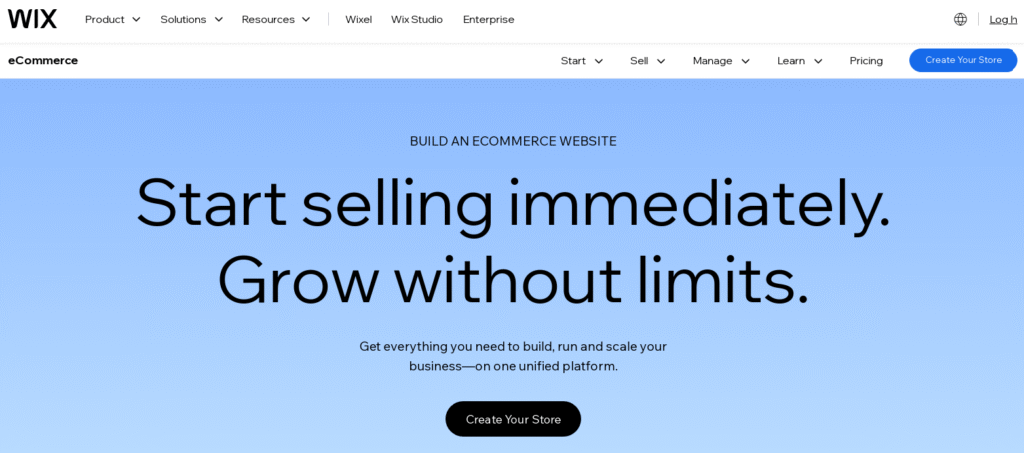
Company Overview
Wix E-commerce is a flexible website builder developed by Wix.com Ltd, a global software company headquartered in Tel Aviv, Israel.
The company powers 800,000+ active stores and is best known for its intuitive visual editor, which allows users to build and customize their online stores with pixel-perfect precision.
It’s an ideal choice for smaller businesses, boutique retailers, artists, and entrepreneurs who value design freedom and ease of use.
Launched in 2006, Wix has evolved into one of the most user-friendly ecommerce website builder companies on the market.
With the introduction of Wix E-commerce, the platform now caters to online sellers who want creative control and powerful commerce functionality in single package.
Moreover, you don’t need any technical skills to create a fully functional, professional-grade store.
It’s as simple as drag, drop, and sell.
Key Features
Wix e-commerce features are well-suited for users who want to combine design and commerce.
- 900+ fully editable templates for e-commerce with drag-and-drop design elements.
- Powerful AI features for fast and exceptional web design.
- Real-time stock tracking, automated alerts, and inventory syncing.
- Options for size, colour, material, etc., with unique SKUs, pricing, and images.
- Automated email sequences to help recover lost sales.
- Built-in payment gateway supporting major cards, PayPal, Apple Pay, and 50+ global third party payment providers.
- Secure checkout with SSL encryption.
- Multichannel selling and mobile optimization.
- Dropshipping integration with platforms like Modalyst and Printful.
- Access to sales insights, visitor behaviour tracking, and marketing campaign data.
User Experience
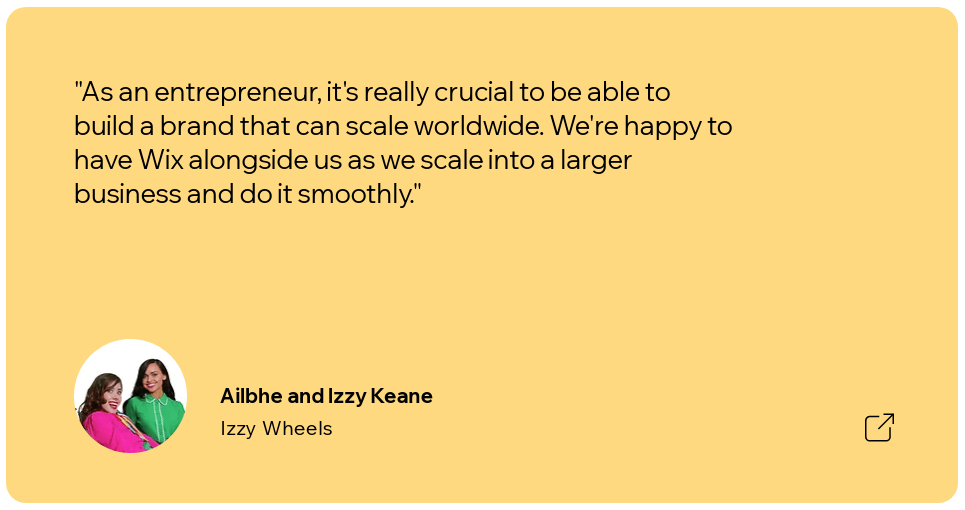
Using Wix, one of the most flexible ecommerce website builder companies is a perfect blend of power, design, and user-friendliness.
As someone who values design, but has no coding skills, I was impressed by how intuitive the drag-and-drop builder is.
I could visually place every element exactly where I wanted it, from product grids to banners and checkout buttons, without feeling restricted by rigid templates.
It gave me the flexibility to match my brand aesthetic down to the last pixel.
You can easily added multiple product variants, set custom pricing, uploaded high-quality images, and even scheduled sales and discounts, all from one dashboard.
The platform guided me through every step with helpful prompts.
And on top of that, it also provided me with built-in tips for SEO, shipping, and mobile optimization.
Advantages
Wix stands out as a versatile ecommerce store builder for those who want full creative control, easy setup, and a platform that supports both business and brand storytelling in one place.
- Offers one of the most powerful drag-and-drop editors in the industry.
- Comes with strong native tools for email marketing, social media ads, and SEO optimization—no need for third-party plug-ins.
- One of the few ecommerce website builder companies that balances ease of use with future growth potential.
Limitations
Here are the limitations that I experience when using the Wix E-commerce solution.
- While it’s excellent for small to mid-sized businesses, it may struggle under the demands of very high-volume stores.
- Lacks advanced features like multi-store management, complex inventory automation, and powerful backend customization.
Pricing & Plans
All Wix E-commerce plans come with custom domain, AI creation tools, and reliable hosting.
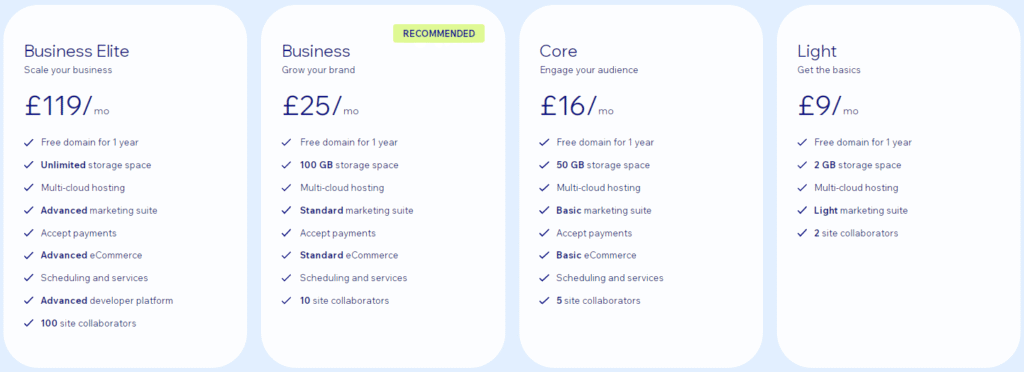
Lite
Price: $9/month
- Features: 2GB storage space, 900+ templates, light marketing suite, 2 users, site analytics, 4 lead capture forms, Google ads facility, 99.99% uptime and 24/7 customer support via chat.
- Best for: users who don’t need e-commerce functionality right away.
Note: The Lite plan doesn’t support online payments or product sales.
Core
Price: $16/month
- Features: 5 users, site analytics, 50GB storage, up to 10 lead capture forms, customer accounts, payment functionality, plans/recurring payments, multichannel selling, up to 50K products, dropshipping integration for 25 products, loyalty program, product reviews and 24/7 live chat customer support.
- Best for: Small businesses looking to sell online through one of the top ecommerce website builder companies.
Business
Price: $25/month
- Features: all features from the Core plan, 10 users accounts, 100GB storage, dropshipping support for 250 products, multiple currencies (up to 6), unlimited back-in-stock notifications, advanced marketing tools, loyalty program integration, 25 lead capture forms, automated sales tax for 100 transactions per month and referral program.
- Best for: expanding businesses.
Business Elite
Price: $119/month
- Features: everything in the Business plan, plus 100 users, unlimited storage, 11 currencies, advanced analytics and marketing tools, custom reports, performance insights, 75 lead capture forms, dropshipping for up to 50,000 products, automated sales tax for up to 500 transactions per month and priority customer care.
- Best for: companies with high sales volume and complex needs.
Wix gives a 14-day free trial, allowing you to test features before committing.
3. Squarespace Commerce
Best For Visually Rich Product Stores ($16/Month)
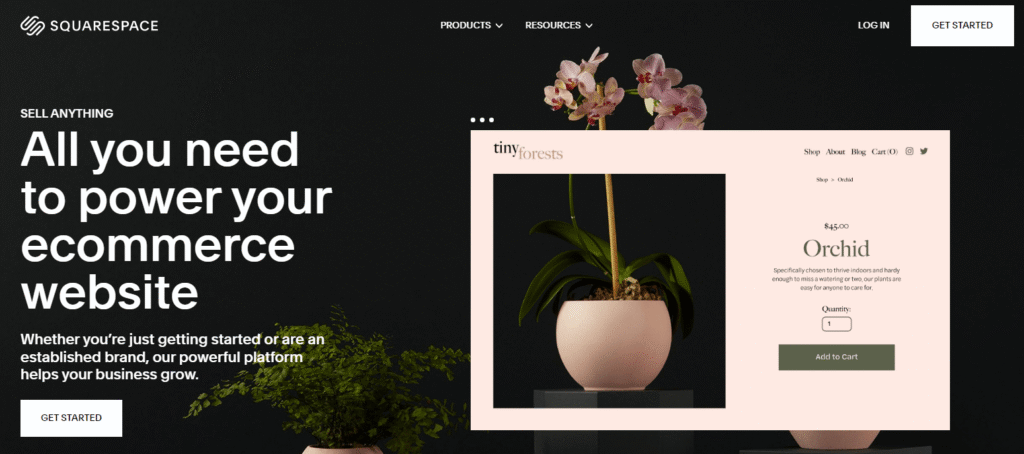
Company Overview
Squarespace is a sleek, design-forward platform that doubles as a website builder and an e-commerce solution.
Founded in 2003 by Anthony Casalena, the company began as a personal website project and has since grown into a publicly traded company (NYSE: SQSP) serving millions of users across more than 180 countries.
Unlike more technical e-commerce website builder companies, Squarespace stands out for its award-winning templates, minimalist aesthetic, and seamless all-in-one ecosystem.
This makes it a go-to choice for photographers, designers, artists, and small business owners who prioritize beautiful design alongside solid functionality.
The platform powers over 4.2 million websites globally, with a significant share of its user base running online stores through Squarespace Commerce.
Key Features
Squarespace Commerce offers a well-rounded feature set that balances visual quality with core e-commerce tools.
- Sell unlimited physical, digital, or service-based products.
- Manage stock levels and track inventory in real time.
- Customize products with size, colour, or material options.
- Back-in-stock notifications.
- AI generated custom website layout based on user input (industry, goals, design style).
- Accept payments via Stripe, PayPal, Apple Pay, Afterpay, and more.
- Mobile-optimized checkout.
- Print shipping labels directly from your dashboard.
- Email campaigns and traffic insights.
- Pop-ups and banners.
- Sales reports and abandoned cart tracking.
User Experience

The interface is well-organized, making it easy to navigate between product pages, store settings, and marketing tools.
Using Squarespace, compared to other ecommerce website builder companies is like stepping into a design studio where everything is already beautifully laid out and ready to customize.
It doesn’t just offer responsive designs, it offers sleek layouts that elevate how your brand and products are presented.
You don’t neeed coding knowledge to tweak the layout, colours, or fonts, it’s all drag-and-drop.
I easily set variants, upload multiple images, schedule product launches, and offer discounts, all from one streamlined dashboard.
Managing sales, tracking inventory and even fulfilling orders are equally painless.
For customers, the shopping experience is distraction-free, and mobile-optimized, which is essential today.
Advantages
Squarespace delivers a polished, professional e-commerce experience that’s perfect for visually driven brands or creative entrepreneurs who want more than just a basic storefront.
- Award-winning templates, optimized for e-commerce, mobile, and desktop.
- Style editor for fine-tuning colours, fonts, layouts, and spacing with no coding.
- AI text generation for product descriptions, headings, about pages, and more.
Limitations
Squarespace may not be the best fit for high-volume stores that require deep backend customization.
- Limited third-party integrations, which can be restrictive for businesses that want to scale with custom functionality.
- Lacks advanced tools found in other ecommerce website builder companies such as multi-location inventory management, built-in dropshipping, and in-depth sales forecasting.
Pricing & Plans
You can save up to 28% of your plan when paying annually.
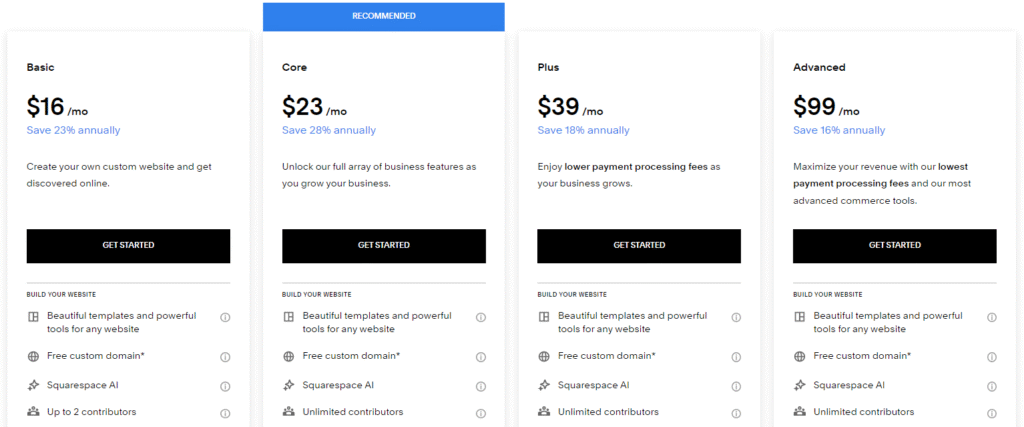
Basic
Price: $16/month
Saving: 23%
- Features: 2 users, designer templates, free domain (1st year), AI tools, SEO features, unlimited bandwidth, 30 min video hosting, SSL security, sell products/services/subscriptions, invoices, fully integrated e-commerce, Squarespace payments, abandoned cart recovery, traffic insights, 2% transaction fees, and 24/7 customer support.
- Best for: start ups.
Core
Price: $23/month
Saving: 28%
- Features: everything in the Basic plan as well as unlimited users, email, 0% transaction fees, shipping/tax services, sales funnels, 5 hours of video hosting, premium integrations, shipping labels, access to Google shopping, e-commerce analytics and promotional pop-ups.
- Best for: small businesses who seek no transaction fees.
Plus
Price: $39/month
Saving: 18%
- Features: all Core plan tools plus 50 hours of video storage & hosting, reduces card payment fees, 1% digital content and membership transaction fee.
- Best for: growing e-commerce stores.
Advanced
Price: $99/month
Saving: 16%
- Features: everything included in the Core plan and 0% digital content and membership transaction fee, unlimited video storage and hosting, lowest credit card rates of 1.5% + $0.25, unlimited video storage and hosting.
- Best for: larger or scaling brands.
A 14-day free trial is available for all new users to explore the platform.
4. Hostinger E-commerce
Best For Simple & Fast Store Setup ($3.99/Month)

Company Overview
Hostinger website builder is a rising contender among ecommerce website builder companies, offering a budget-friendly yet powerful platform designed for beginners and small business owners.
Originally launched as Zyro, the website builder was developed by Hostinger, one of the world’s leading web hosting companies founded in 2004 in Lithuania.
Over time, Zyro was rebranded under the Hostinger umbrella to unify its product suite and offer a more integrated experience for users.
The website builder is fully no-code, AI-powered, and optimized for launching fully functional online stores.
It’s best suited for merchants with a smaller product catalogues who value speed, simplicity, and low cost over deep customization or third-party app ecosystems.
Key Features
Hostinger website builder features are designed for building lightweight and fast-loading websites, something crucial for SEO and user experience.
- No code, drag-and-drop website builder.
- You can list, manage, and sell both physical and digital products.
- Real-time order tracking, auto-inventory updates, and customizable order notifications.
- 100+ payment options, including PayPal, Stripe, and credit cards.
- Shipping rules set up that adjust automatically based on customer location.
- Discount codes and gift cards.
- Built-in SEO tools, Facebook Pixel, Google Analytics and newsletter integrations.
- Multi-currency support.
User Experience
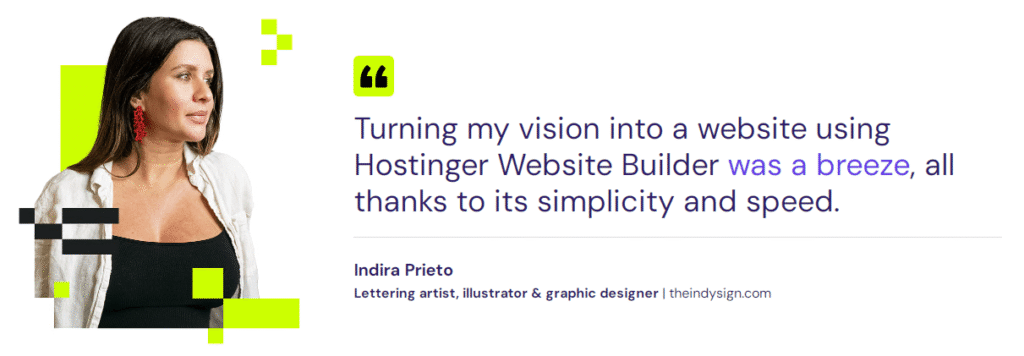
If you’re looking for ecommerce website builder companies, Hostinger is a good entry point.
From the start, the modern interface guided me step-by-step through building my site.
I was able to choose a template that already looked like a real store.
Then I could tweak every section, product layouts, checkout flow, and the homepage banners with simple drag-and-drop tools.
Adding products took a few clicks, and the dashboard made it easy to upload images, write descriptions, and set up variations like sizes or colours.
The AI product description generator saved me a lot of time when adding inventory.
It didn’t feel overwhelming, even as I started setting up payment gateways and shipping zones.
Advantages
Based on value, ease of use, and speed, Hostinger stands out as a smart, low-barrier entry point.
- 0% Hostinger transaction fees.
- AI-driven features likes AI Product Description Generator, AI Heatmap and AI Logo Maker.
- Ecommerce optimized and mobile responsive templates.
Limitations
Due to its simplicity, Hostinger has some limitations when compared to more advanced ecommerce website builder companies.
- It doesn’t have a full-fledged app marketplace, so you have access to fewer third-party plug-ins and integrations.
- Experienced users may find the customization options restrictive.
- Provides basic e-commerce tools only.
Pricing & Plans
Save 71% of your Hostinger plan, when you opt-in for a 48 months term.
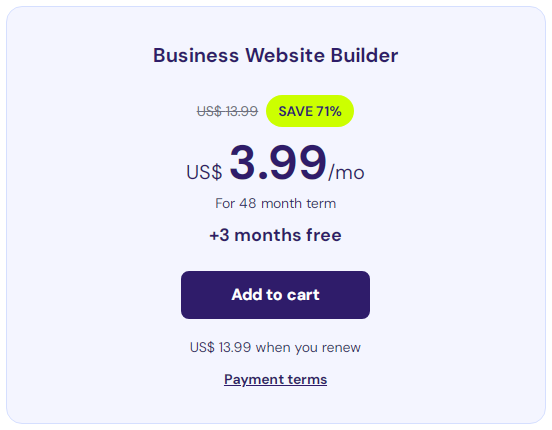
Business
Price: $3.99/month
Saving: 71% + 3 months free
- Features: up to 50 sites, sell up to 600 products, 150 templates, mobile editing, free domain (1st year), 100+ payment gateways, 0% transaction fees, inventory management, AI website builder, AI-writer, AI product generator, discount codes, SSL, unlimited bandwidth, unlimited storage, drag-and-drop & mobile editing tool, marketing integrations and 24/7 customer support.
- Best for: new e-commerce businesses on a budget.
The plan also comes with 30-day money-back guarantee.
5. Sellfy
Best For Digital Product Creators ($22/Month)
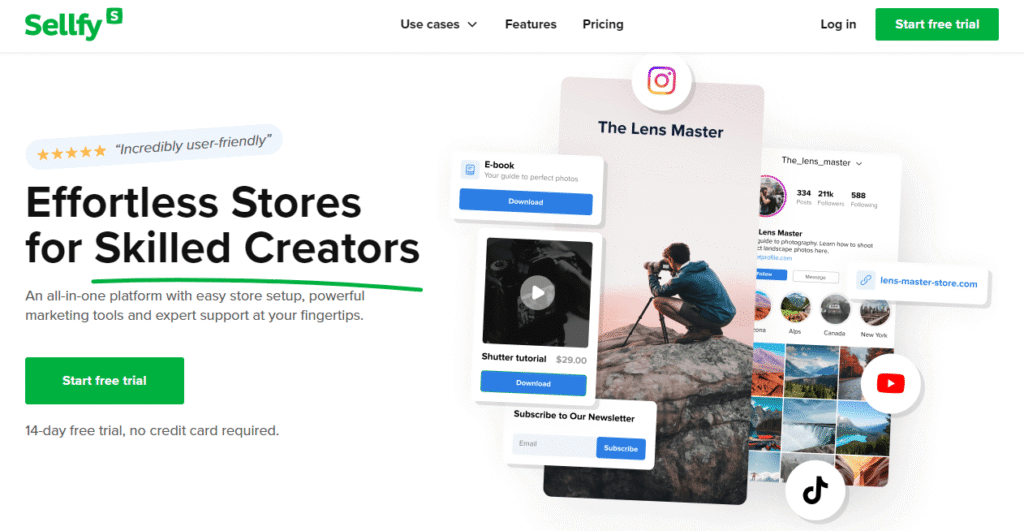
Company Overview
Sellfy is a cloud-based e-commerce platform built specifically for creators, entrepreneurs, and small businesses aiming to sell digital products, physical goods, subscriptions, and print-on-demand merchandise without fuss.
It’s a streamlined, user-friendly platform that empowers the users to monetize their products efficiently, making it a compelling option among ecommerce website builder companies.
Founded in 2011 by Maris Dagis in Latvia, the company has become a go-to solution for over 60,000 creators worldwide, facilitating more than $140 million in total revenue.
The platform offers an intuitive, no-code interface, allowing users to set up and customize their online stores quickly.
In addition to its core e-commerce functionalities, it provides marketing tools such as discount codes, and email marketing automation.
Key Features
Sellfy’s purpose-built platform offers a simplified yet powerful suite of tools for selling digital products, subscriptions, and print-on-demand items.
- Fully hosted storefront with mobile-optimized, customizable templates.
- No need for coding or external plug-ins.
- Easily upload and sell digital files like ebooks, music, software, video, design assets, and more.
- Automatic download limits and anti-piracy tools.
- You can embed products, buy buttons, and entire storefront directly into any existing site using simple code snippets.
- Discount coupons, upsell features, cart abandonment emails, and email marketing capabilities.
- Accept payments via PayPal and Stripe, and sell in multiple currencies to reach a global audience.
- Detailed reports on traffic, sales, conversions, and top-performing products directly from your dashboard.
- No transaction fees on any of its plans.
- Mobile-optimized checkout.
User Experience

Among today’s top ecommerce website builder companies, Sellfy delivers a seamless, creator-friendly solution.
The dashboard is easy to use, with clearly labelled sections for products, orders, marketing, and analytics.
Adding products is straightforward, whether these are digital downloads, print-on-demand merchandise, or subscriptions.
The system automatically handles file hosting and delivery for digital products, removing the headache of configuring external storage or download links.
Uploading and organizing products only takes a few minutes, and everything including pricing, thumbnails, and variants was easy to manage.
All selling tools are already baked in from email marketing and discount codes, to up-selling, and affiliate programs.
I didn’t have to search for apps or worry about third-party integrations.
Advantages
The main advantages that set Sellfy apart from other online web store builders include:
- Unlike many e-commerce platforms that treat digital products as an add-on, Sellfy was built with them in mind.
- Integrates directly with print-on-demand fulfilment.
- Offers recurring billing models for subscriptions and memberships.
Limitations
While Sellfy is a great option for digital creators and small business owners, it’s important to understand where it falls short compared to other ecommerce website builder companies.
- The template customization options are fairly basic.
- No plug-in or app store, what you see is what you get, great for simplicity, but limiting if you need additional functionality.
Pricing & Plans
Sellfy offers up to 25% saving on it yearly plans.
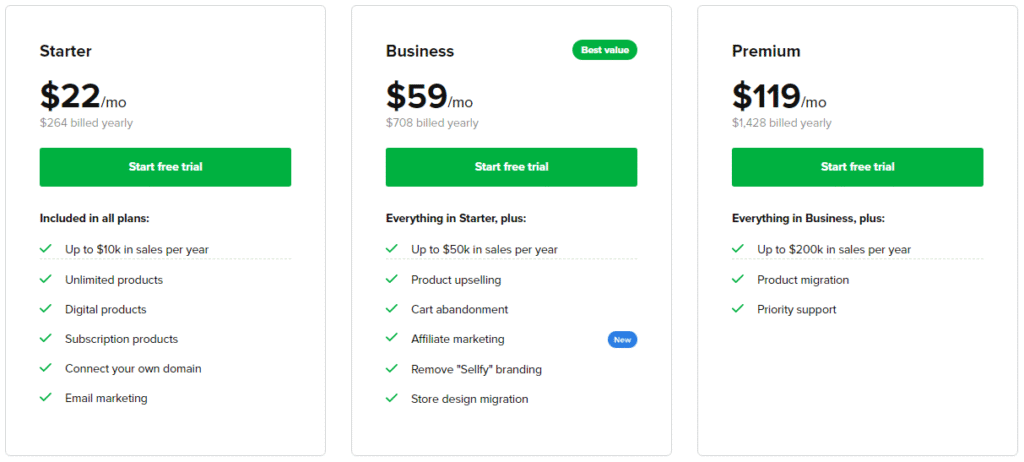
Starter
Price: $22/month
Saving: 24%
- Features: 0% transaction fees, up to 10K sales per year, sell print-on-demand, physical, digital products, or subscriptions, store editor, 10GB product file size, discount codes, email marketing, free SSL, advances tax & VAT settings, mobile-optimized, payments and access to store themes.
- Best for: users who don’t mind the Sellfy logo on their website.
Business
Price: $59/month
Saving: 25%
- Features: includes all Starter plan tools plus 50K sales per year, product up-selling, abandoned cart, no Sellfy branding, store design migration, 15GB product file size, and affiliate marketing.
- Best for: growing sellers looking to scale.
Premium
Price: $119/month
Saving: 25%
- Features: everything in the Business plan as well as up to 200K annual sales volume, 15GB maximum product file size, product migration and priority technical support.
- Best for: high-volume sellers who need priority support.
All plans come with 14-day free trial.
6. Webflow
Best For Full Web Design Control ($29/Month)
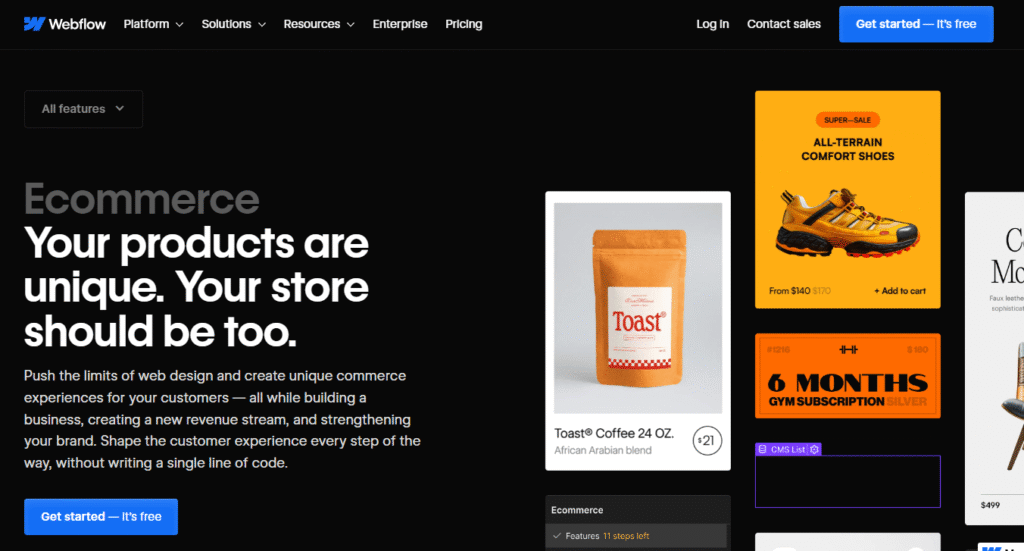
Company Overview
Webflow is a powerful visual web design platform that merges the flexibility of front-end coding with the convenience of a no-code editor, making it a robust option amongst modern ecommerce website builder companies.
For ecommerce specifically, the company introduced its ecommerce features in 2018, enabling users to build online stores that are deeply integrated with their brand identity and site design, rather than using cookie-cutter layouts.
Webflow is best for businesses, agencies, or designers that prioritize design precision and want to create a truly unique, immersive shopping experience.
In addition, it has raised over $330 million in funding, positioning it as a key player in the no-code, website building movement.
Key Features
Webflow offers a wide range of features tailored to users who want full design flexibility alongside robust e-commerce functionality.
- Add custom fields to product pages like colour swatches, specs, or download links.
- Complete control over your cart and checkout page designs.
- Track product availability and set stock limits for individual products.
- Auto integration with TaxJar to calculate sales tax for U.S. transactions.
- Create custom shipping options based on location, weight, price, or flat rate.
- Accept secure payments via Stripe or PayPal, including credit/debit cards and digital wallets.
- Support multiple currencies and recurring payments through third-party integrations.
- Automatic order confirmations, shipping updates, and cart abandonment emails.
User Experience
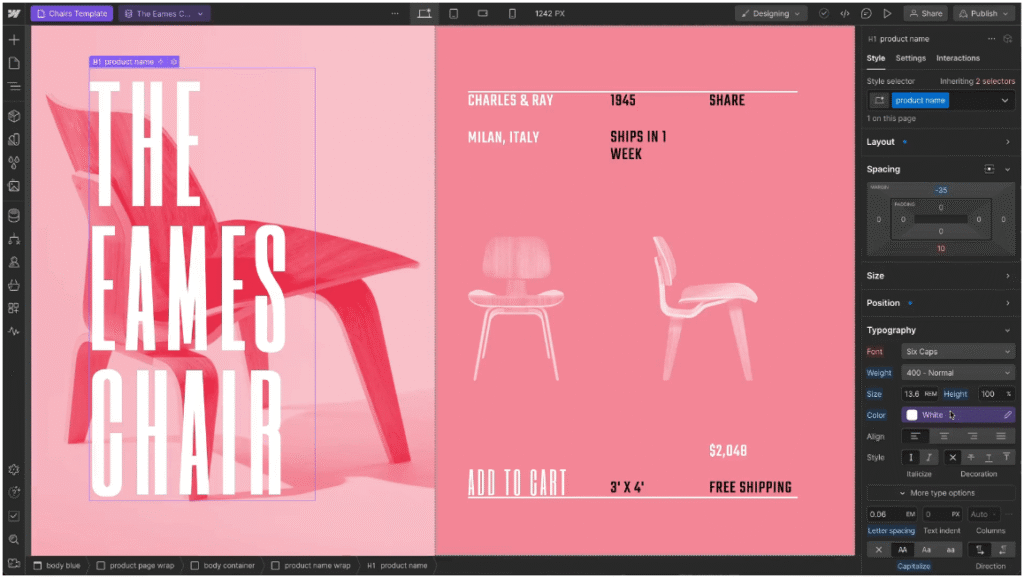
Webflow as one of the most advanced ecommerce website builder companies on the market.
When I started building a store with it, I noticed how much creative freedom I had.
The visual editor, while had a learning curve, was incredibly detailed, letting me shape every part of my site from homepage banners and product pages to the checkout flow, exactly how I envisioned it.
Unlike more template-driven platforms, Webflow doesn’t limit your ideas.
I could customize layouts, animations, interactions, and branding down to the pixel.
It’s perfect for creating a storefront that doesn’t look like every other online shop out there.
Advantages
For those who are willing to climb a slightly steeper learning curve, Webflow offers unmatched creative freedom in the ecommerce space.
- Pixel-perfect control over every page element using its powerful visual designer.
- No themes or premade templates, instead, it offers a blank canvas with drag-and-drop freedom and structured design logic, allowing you to build a store as unique as your brand.
- Runs on Amazon Web Services (AWS) and Fastly CDN, ensuring fast global page speeds and high uptime.
Limitations
Webflow is one of the ecommerce website builder companies that is better suited for design-centric brands or creative professionals rather than sellers who prioritize convenience, and plug-ins.
- Users unfamiliar with design principles, layout grids, or CMS structures may find it overwhelming at first.
- It doesn’t have a built-in app marketplace, limiting your ability to expand store functionality.
Pricing & Plans
With a yearly Webflow plan you save up to 30%.
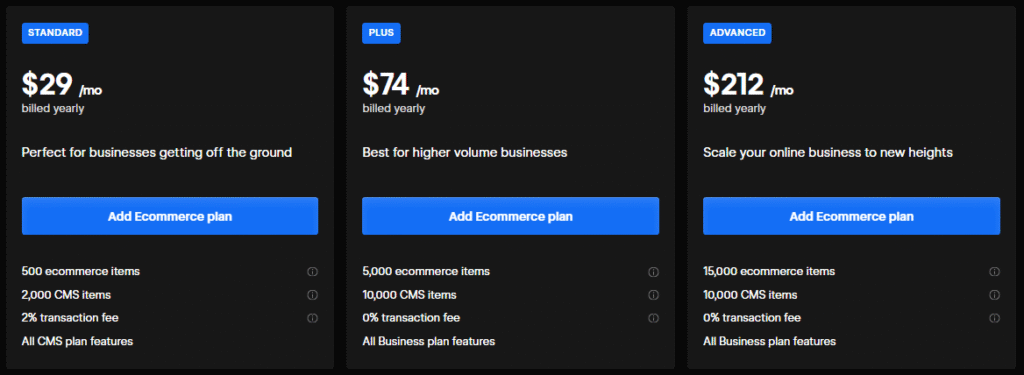
Standard
Price: $29/month
Saving: 30%
- Features: 3 users, list up to 500 products, 2,000 CMS items, custom shopping rules, 2% transaction fee, email customization, custom code integration, 2,000 membership accounts, custom checkout, custom shopping cart, selection of payment methods, automatic tax calculation, unlimited sales volume, social media integration, custom domain, surge protection and 50GB bandwidth.
- Best for: start-ups that want full design freedom.
Plus
Price: $74/month
Saving: 12%
- Features: included everything in the Standard plan and supports up to 5,000 products, 10,000 CMS items, 10 users, 0% transaction fees, 100GB bandwidth, unbranded emails, site search function
- Best for: growing online stores that need higher product limits
Advanced
Price: $212/month
Saving: 10%
- Features: all tools from the Plus plan including 15,000 products, form file upload and choice of up to 2.5TB bandwidth and support for 15 users.
- Best for: high-volume ecommerce stores.
7. ShopWired
Best For UK-Based Online Stores (£24.27/Month)
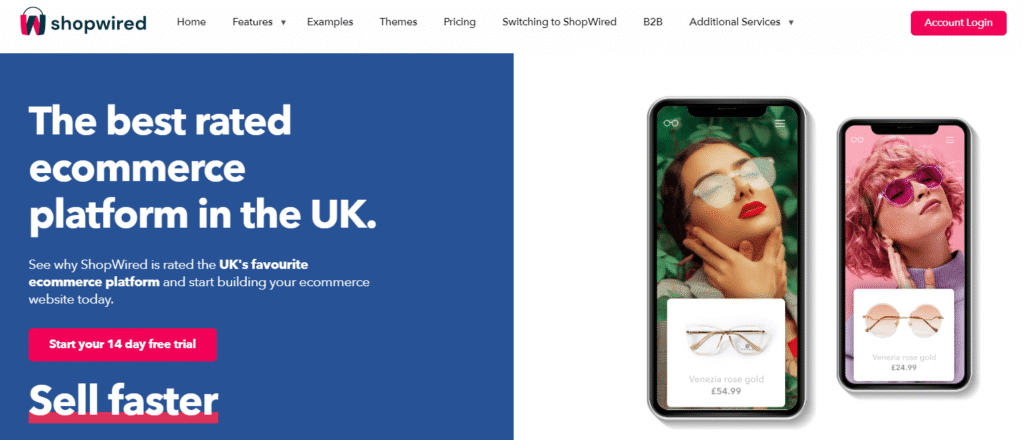
Company Overview
ShopWired is one of the top-performing, UK-based ecommerce website builder companies.
The platform was built to serve ambitious online retailers looking for robust features, flexibility, and excellent customer support.
Launched in 2013, ShopWired has quickly grown into one of the UK’s leading e-commerce solutions, processing more than £1 billion in sales annually.
It was designed with growing businesses in mind, offering scalable tools, fast-loading themes, and enterprise-grade features at a fraction of the cost of many competitors.
ShopWired’s dedicated UK-based customer support team consistently earns high praise for fast response times and in-depth technical help.
According to Trustpilot, ShopWired boasts a near-perfect customer rating, underscoring its reputation for reliability and service quality.
Key Features
ShopWired offers a comprehensive toolkit designed to meet the needs of both growing online retailers and large-scale enterprises.
- A range of sleek, mobile-optimized templates designed to convert across devices.
- Each theme is fully editable via the theme editor or custom code.
- List unlimited products, variants and categories.
- Built-in SEO tools.
- Seamlessly connect to Amazon, eBay, Facebook, Instagram, and Google Shopping.
- Advanced discount engine and promotions.
- Growing app store for advanced customization and third-party integrations.
- Display prices and accept payments in multiple currencies using real-time exchange rates.
- Fully compliant with UK/EU data and tax regulations, including built-in VAT handling and cookie consent tools.
User Experience

ShopWired is one of the most reliable ecommerce website builder companies I’ve tested, and it delivers on its promise.
From the get go, the platform impresses with a well organized and intuitive interface.
I can easily navigate between products, orders, and customer data without a developer’s help.
The theme editor is flexible enough for users with coding skills.
But even as a non-developer, I found it easy to customize the look and feel of my store using the built-in design tools.
Uploading products with variants, setting up collections, and managing stock is also quick and straightforward.
The UK-based customer service team is responsive and hands-on, answering questions in plain language.
Advantages
ShopWired strikes a smart balance for users who want both simplicity and depth.
- Core features like abandoned cart recovery, multi-currency support, B2B pricing, and advanced discounting are standard, saving you money and setup time.
- Selling 10 products or 10,000, it maintains speed and usability, with no steep learning curve or need for constant upgrades.
- The customer support team consistently receives top ratings for their fast response times and in-depth guidance.
Limitations
While ShopWired is among the best ecommerce website builder companies for its robust features and user-friendly design, it comes with a few limitations.
- Although, it supports international selling, some built-in settings are optimized for the UK market.
- The selection of pre-designed themes is relatively small compared to platforms like Shopify or Wix.
Pricing & Plans
Save up to 30% on your plan with ShopWired’s yearly pricing.
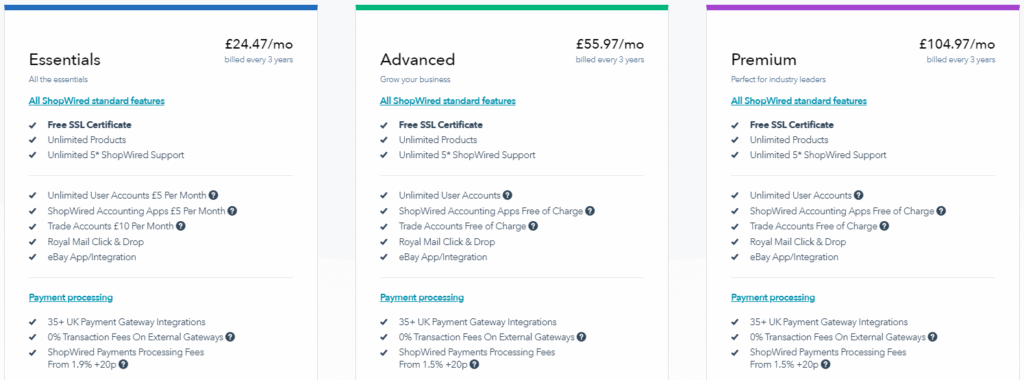
Essentials
Price: £24.47/month
Saving: 30%
- Features: unlimited product listings, £50K per year turnover, free SSL, professional themes, customization options, full CMS, abandoned basket recovery, buy now-pay later, order fulfilment, product previews, social media integrations, discounts, automatic backups, visitor tracking, 35+ payment gateways, stock management, sales reports and 0% transaction fees.
- Best for: start-ups entering the ecommerce space.
Advanced
Price: £55.97/month
Saving: 30%
- Features: all Essential plan features plus unlimited users, free accounting apps, turnover up to £200K per year, free trade accounts, ShopWired payments fees from 1.5% +20p, advanced reports, and access to 3,000 external apps.
- Best for: growing businesses.
Premium
Price: £104.97/month
Saving: 30%
- Features: supports all Advanced plan features including turnover up to £500K per year, third party support, free access to all apps, and priority support.
- Best for: established online stores.
ShopWired also offers 14-day free trial across all plans.
8. GoDaddy E-commerce
Best For Fast, Code-Free Ecommerce Setup ($20.99/Month)
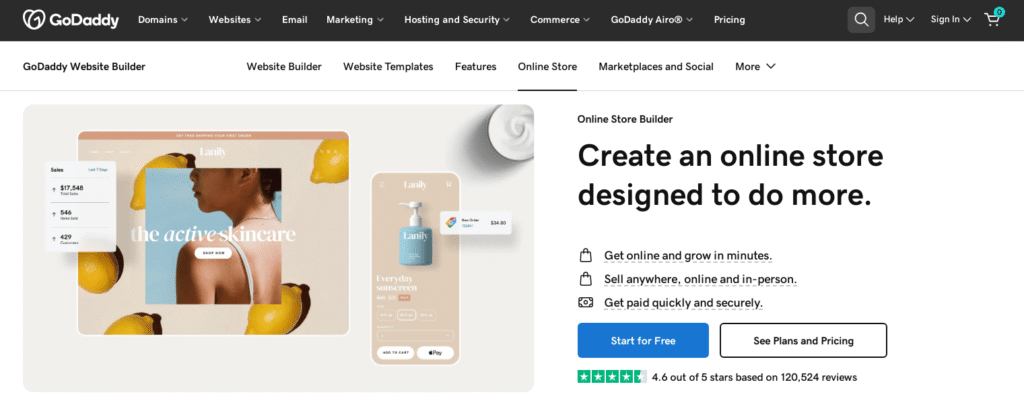
Company Overview
GoDaddy stands out among ecommerce website builder companies for its simplicity, speed, and all-in-one setup tailored for entrepreneurs and small businesses launching online stores.
Originally founded in 1997 as a domain registrar and web hosting provider, it’s evolved into a comprehensive digital platform offering e-commerce tools, marketing solutions, and website design features.
The e-commerce website builder, part of the GoDaddy Websites + Marketing suite, is designed to help users quickly build and manage online stores without the need of coding knowledge.
Key Features
GoDaddy’s robust set of features are tailored for small businesses and solo entrepreneurs.
- Product management.
- Flexible payment options.
- Automatic abandoned cart recovery.
- Integrated shipping tools.
- Email marketing.
- Drag-and-drop editor.
- Pre-designed templates.
- Text generating tools.
- Mobile-responsive themes.
- 24/7 expert customer support.
User Experience

GoDaddy’s setup process is quick, within minutes, I had a fully functional storefront live thanks to the AI website builder that asked me a few questions and generated a clean, mobile-friendly design.
The drag-and-drop editor is intuitive and gives full control over layout, images, product displays, and colour schemes.
While it doesn’t offer the same design flexibility as ecommerce website builder companies like Wix, it makes up for it with its ease-of-use.
Managing products, inventory, and orders is simple, everything syncs from one central dashboard, and the learning curve is minimal, even for a beginner.
Connecting my store to Instagram, and Amazon took just a few clicks, and all orders flowed into the same backend, making fulfilment and tracking easier than expected.
Advantages
GoDaddy’s main advantages over its competitors include:
- Fast and straightforward setup process, allowing you to launch an online store in minutes.
- Order and inventory management.
- Selling through social media.
Limitations
Here are GoDaddy’s drawbacks that you should consider:
- Higher transaction fees which can impact your profit margins.
- The advanced e-commerce functionalities like advance inventory management are limited or unavailable.
Pricing & Plans
With a yearly term you save 40% on the Commerce plan.
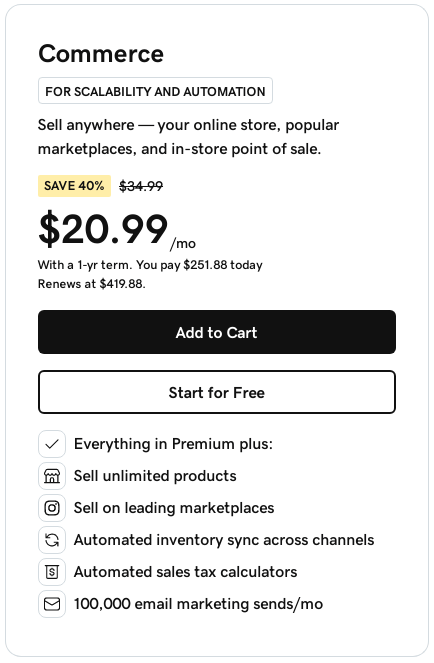
Commerce
Price: $20.99/month
Saving: 40%
- Features: 100+ templates, marketing dashboard, payment processing, free email, unlimited products, multichannel sales, automated inventory sync, 100K emails per month, auto sales tax calculation, SSL certificate, SEO tools, content/design tools, 2.7% transaction fees + $0.30 per transaction and 24/7 technical support.
- Best for: quick online store launches.
GoDaddy allows you to test the platform for free before you commit.
9. Volusion
Best For Mid-Sized Online Shops ($35/Month)
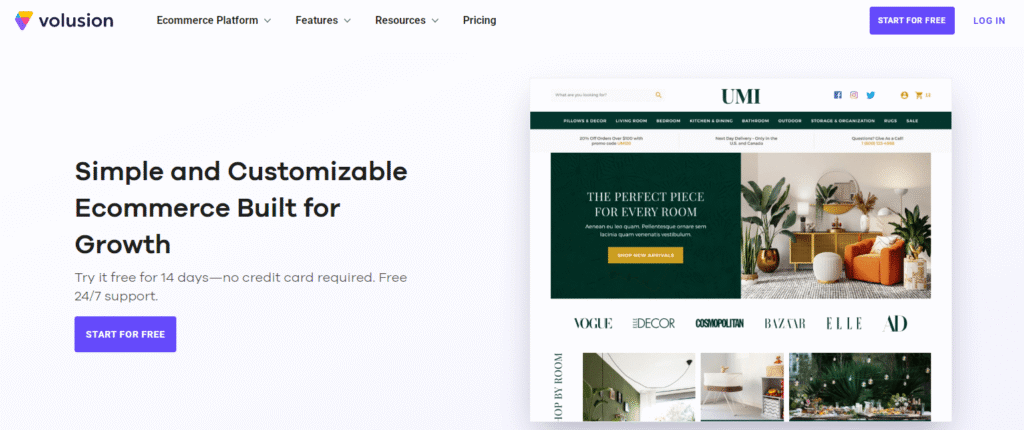
Company Overview
Volusion is one of the oldest ecommerce website builder companies that has been helping businesses sell online since 1999.
Known for its robust inventory management and built-in analytics, it’s tailored for product-focused businesses that need a data-driven approach to selling.
The platform is suitable mid-sized retailers who want more than just a beautiful storefront, they want actionable insights and powerful backend tools to optimize their operations, all from a centralized dashboard.
Headquartered in Austin, Texas, the company has supported over 250,000 entrepreneurs and online merchants, processing billions in gross merchandise volume (GMV) since its inception.
Key Features
Volusion offers a well-rounded e-commerce tools designed to help businesses manage, optimize, and scale their online stores efficiently.
- Drag-and-drop content editor.
- Variant and SKU management like size, colour, etc.
- Inventory tracking with automatic low-stock alerts.
- Digital and physical product support.
- Integrated payment processing.
- Customizable tax rates and shipping options.
- Real-time analytics dashboard.
- Abandoned cart reports and customer segmentation tools.
- App marketplace.
- Integrations with platforms like Amazon, eBay, and Facebook Shops.
User Experience
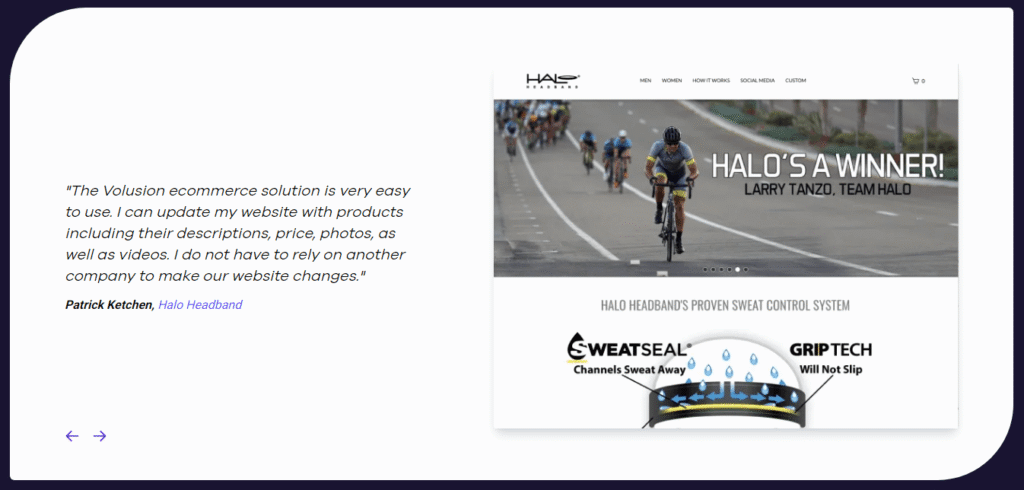
Among the ecommerce website builder companies, Volusion is a practical and business-focused choice, especially if your priority is managing products and sales data with precision.
The setup process is easy, with guided on-boarding and a clean admin interface that makes it easy to add products, organize categories and configure payment and shipping settings.
It has excellent inventory management system, offering bulk import tools, stock tracking, and variant management that felt more advanced than some competitors.
The drag-and-drop editor isn’t as visually flexible as platforms like Wix or Shopify, but it still allows for decent customization with access to HTML and CSS for those comfortable with code.
Navigating between features is intuitive, and support is responsive when needed.
Advantages
Volusion’s long-standing presence and focus on core e-commerce functionality make it ideal for retailers who prioritize management tools over flashy design.
- Excels at inventory control with features like variant management, stock tracking, and bulk product imports.
- Built-in, detailed analytics for sales, traffic, conversion rates, and customer behaviour, ideal for data-driven decision-making.
- The architecture is well-suited to scaling businesses.
Limitations
Volusion comes with some trade-off, when compared to more design-focused ecommerce website builder companies.
- Customizing layouts beyond basic edits requires HTML/CSS knowledge, which may not suit beginners.
- Lagged behind competitors in rolling out new features and modern user interface (UI) improvements.
Pricing & Plans
All plans offer 0% transaction fees when using Volusion Payments.
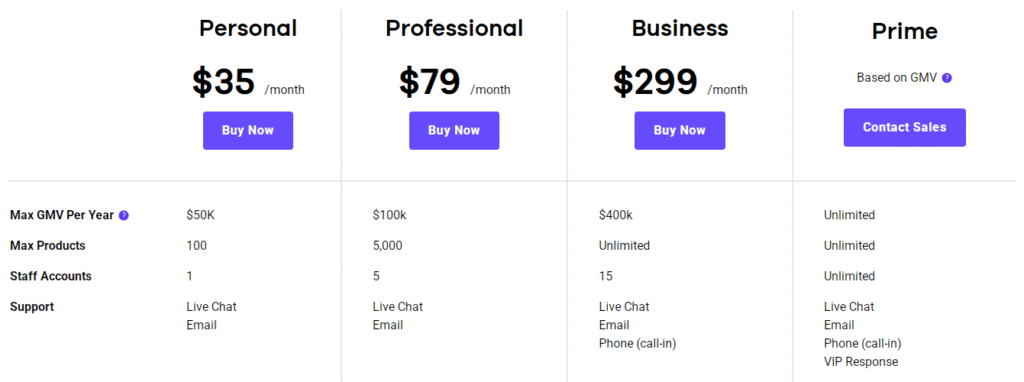
Personal
Price: $35/month
- Features: supports 1 user, 100 products, up to $50K turnover, website builder, editor, payment integrations, check out, built-in management tools, SSL certificate, connect a custom domain, PCI compliance, fully hosted, unlimited bandwidth, live chat and email support.
- Best for: starting out with online selling.
Professional
Price: $79/month
- Features: included all Personal plan tools, plus: 5 users, list up to 5,000 products, $100K annual turnover limit, phone orders, CRM, abandoned cart reports, product ratings & reviews, and import/export.
- Best for: expanding businesses.
Business
Price: $299/month
- Features: everything in the Professional plan and unlimited product listings, 15 users accounts, £400K yearly turnover limit, API access, batch order processing, customer loyalty plan, and customer support via live chat, email and phone, which many ecommerce website builder companies don’t offer.
- Best for: mid-sized online stores.
Prime
Price: based on sales volumes
- Features: all Business plan features as well as unlimited turnover, unlimited users, client success manager, early access to new tools, better rates on additional Volusion services, and technical support via email, chat, phone and VIP response.
- Best for: high revenue businesses that need tailored solutions.
You can also sign up for a 14-day free trial using my link below.
10. PrestaShop
Best For European Stores (€24/Month)
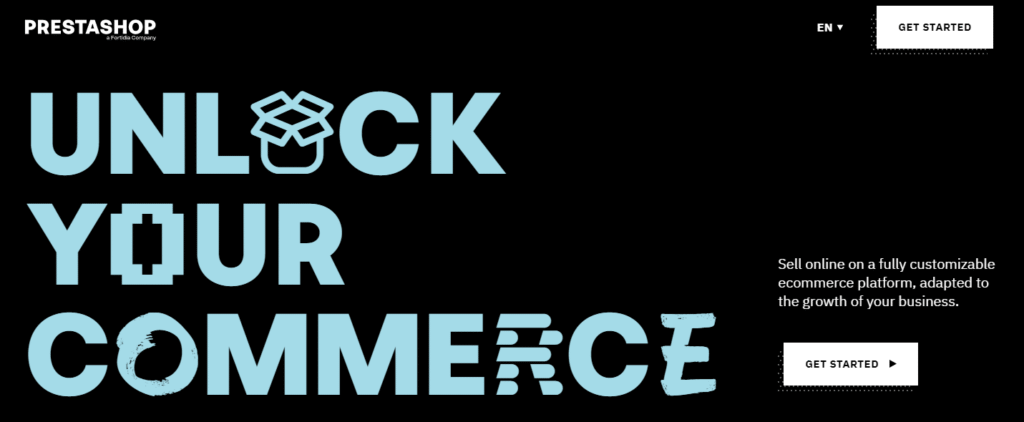
Company Overview
PrestaShop is a powerful open-source e-commerce site builder designed to give businesses complete control over their online store.
As an open-source solution, it’s free to download and customize, making it an ideal choice for developers, tech-savvy entrepreneurs, or businesses with access to web development resources.
Founded in 2007 in Paris, France, PrestaShop has grown to power over 250,000 active online stores in more than 190 countries.
In 2021, it was acquired by MBE Worldwide, helping further its mission to become one of the ecommerce website builder companies serving enterprise-level clients and mid-market businesses looking for flexibility and scalability.
Key features
PrestaShop provides a solid set of core e-commerce features, including:
- Unlimited products, categories, and attributes.
- Advanced stock management and product combinations.
- Drag-and-drop page builder via third-party modules.
- Multilingual and multi-currency support.
- Integrates with European payment providers like Klarna, Mollie, and Stripe.
- Supports European carriers such as DPD, La Poste, and DHL Europe.
- Customer account management with order history and tracking.
- Abandoned cart recovery modules.
- Product reviews, wishlists, and product comparison.
User Experience
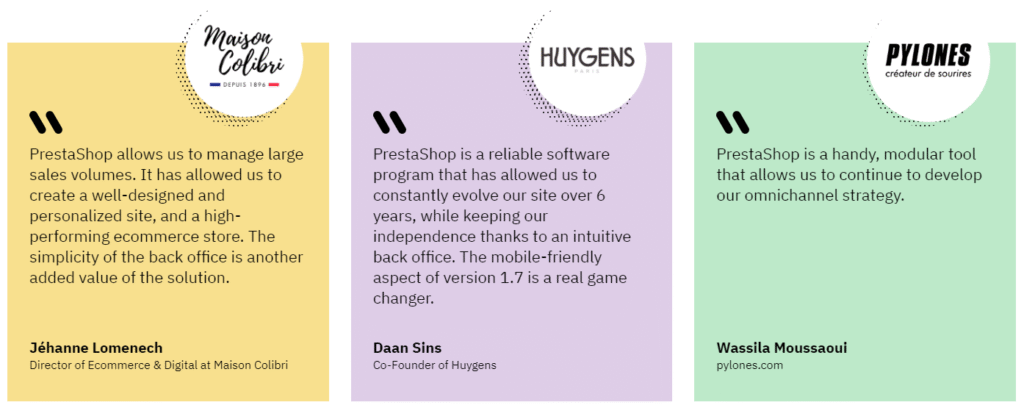
If you’re comfortable navigating some technical setup, PrestaShop is a powerful toolbox that gives you total creative freedom.
Unlike more rigid, template-driven platforms, it lets you build exactly what you envision, which is a huge plus if you’re targeting a specific niche or regional market like Europe.
The admin dashboard is feature-rich, offering deep customization for products, payments, taxes, shipping, and design.
It took a little time to get used to, but once I understood the layout, I found it very capable and intuitive for running a professional store.
The Addons Marketplace also gave me access to hundreds of modules, ranging from SEO tools to marketing automation that helped extend my store’s capabilities.
Advantages
Below are the main advantages that set PrestaShop apart from other ecommerce website builder companies:
- Open-source platform that gives developers and advanced users full access to modify the code, enabling unlimited customization.
- Thousands of modules, themes, and integrations available to enhance your store’s functionality.
- Advanced product management.
Limitations
Every ecommerce site builder has limitations, and PrestaShop is no exception.
- Requires technical knowledge to set up, customize, and maintain, making it less ideal for non-technical users.
- Core software is free, but many essential features must be purchased from PrestaShop’s Marketplace.
Pricing & Plans
PrestaShop’s flexible model from free open-source to enterprise-grade plans makes it one of the more versatile ecommerce website builder companies.
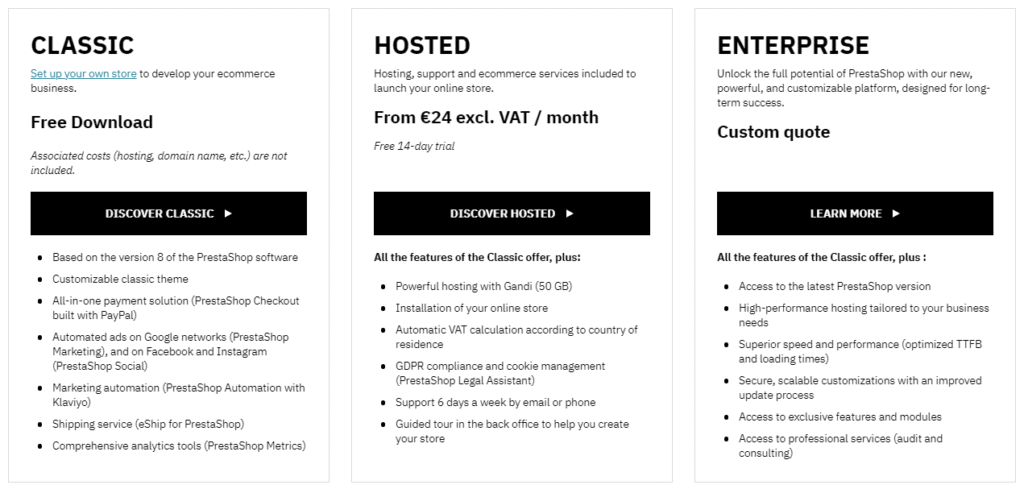
Classic
Price: free download
- Features: unlimited products, unlimited users, SEO tools, customer segmentation, PayPal checkout, app store, tracking tools, free Classic theme, and help centre.
- Best for: users who can manage a self-hosted e-commerce platform.
Hosted
Price: €24/month
- Features: everything in the Classic plan, plus: 50GB Gandi hosting, online store installation, GDPR compliance, auto VAT calculation, connect a custom domain, social media integrations, accounting reports, legal assistant, store backup, and email, live chat and phone support.
- Best for: plug-and-play ecommerce experience.
Enterprise
Price: custom
- Features: includes all Hosted plan features as well as tailored hosting, latest PrestaShop version, data export, enhanced security, speed optimization, exclusive modules/features, audits, consulting services, security patches, migration tools, and customer support.
- Best for: custom e-commerce solutions.
You also get 14-day free trial with every Hosted plan.
11. Ecwid
Best For Adding A Store To An Existing Site (£5/Month)
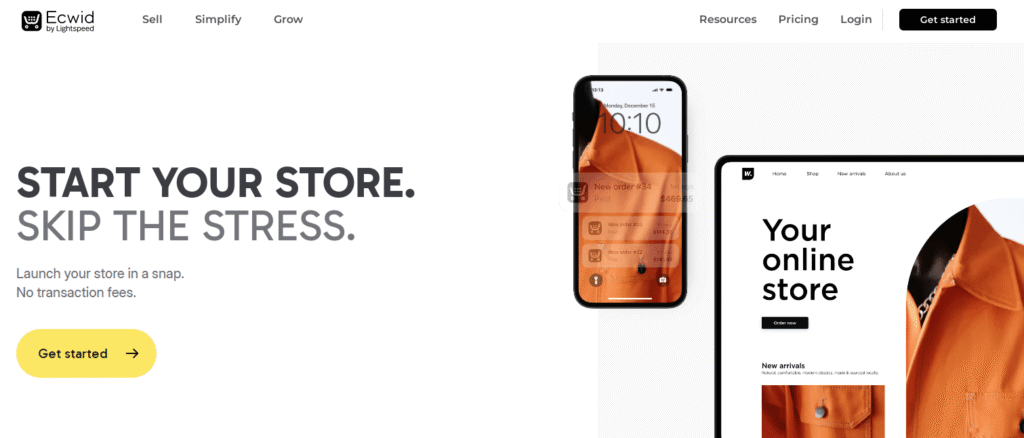
Company Overview
Ecwid is a cloud-based ecommerce solution that seamlessly integrates online stores into existing websites, social media platforms, and marketplaces.
The platform supports over 1 million merchants in more than 175 countries, making it a one of the widely adopted ecommerce website builder companies.
Founded in 2009, Ecwid (short for “ecommerce widget”) has become an attractive option for merchants who already have a website but want to add ecommerce functionality without the hassle of rebuilding their entire digital storefront.
In 2021, Ecwid was acquired by Lightspeed Commerce, a Canadian retail and restaurant platform, adding robust POS and inventory management to its ecommerce offering.
Key features
Ecwid offers a well-rounded e-commerce features tailored for selling across multiple platforms with minimal setup.
- Mobile-friendly storefronts.
- Inventory and product management facilities.
- One-page checkout for faster conversion.
- Supports 50+ payment gateways including Stripe, PayPal, Square, and Apple Pay.
- Custom shipping rules.
- Automated tax calculations.
- Connect your online and offline sales in one unified inventory and payment system.
- Multiple currencies.
- Localized checkout experiences.
User Experience
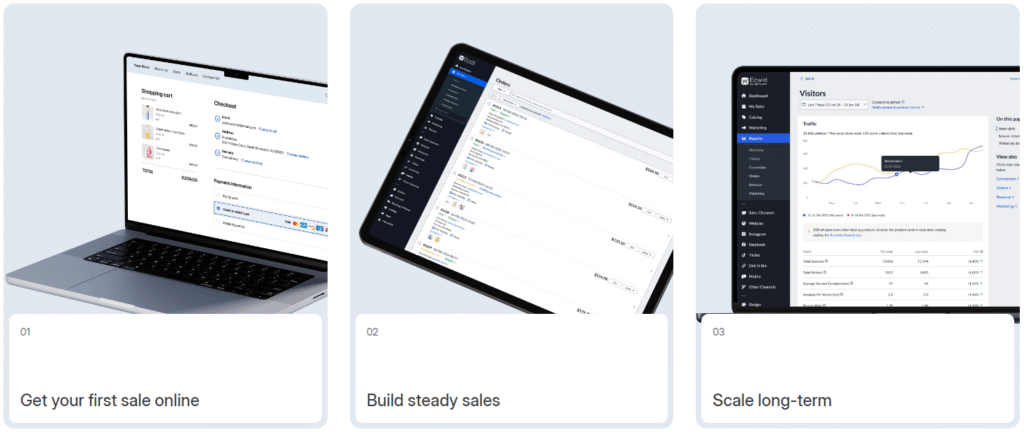
Ecwid is up there with some of the most intuitive ecommerce website builder companies that I’ve tested.
Once I embedded the store into my WordPress site, I realised how effortless the setup process was, no coding needed, and everything just worked.
The interface is well-designed and easy to use, even for those new to e-commerce.
What truly elevated the experience is Ecwid’s multichannel capabilities.
You can sync your entire catalogue and sell directly on Facebook, Instagram, TikTok and marketplaces like Amazon and eBay, all from one centralized panel.
The mobile app is also an excellent addition, offering real-time notifications, order tracking, and inventory management on the go.
Advantages
What sets Ecwid apart is its ability to plug into any existing site whether it’s built on WordPress, Wix, or even a custom-coded platform.
- Can be embedded into any existing website without having to rebuild it from scratch.
- Native selling integrations with Facebook, Instagram, TikTok, Google Shopping, and Amazon, enabling true omnichannel commerce.
- Manage your store on the go with the Ecwid mobile app.
Limitations
Despite its solid reputation, Ecwid has some drawbacks.
- Design flexibility is restricted since it’s an add-on to existing sites.
- Not ideal for large product catalogues.
- Essential features such as product filters, abandoned cart recovery, and priority support are locked behind higher-tier plans.
Pricing & Plans
Like most ecommerce website builder companies, Ecwid offers 16% saving on its yearly plans.
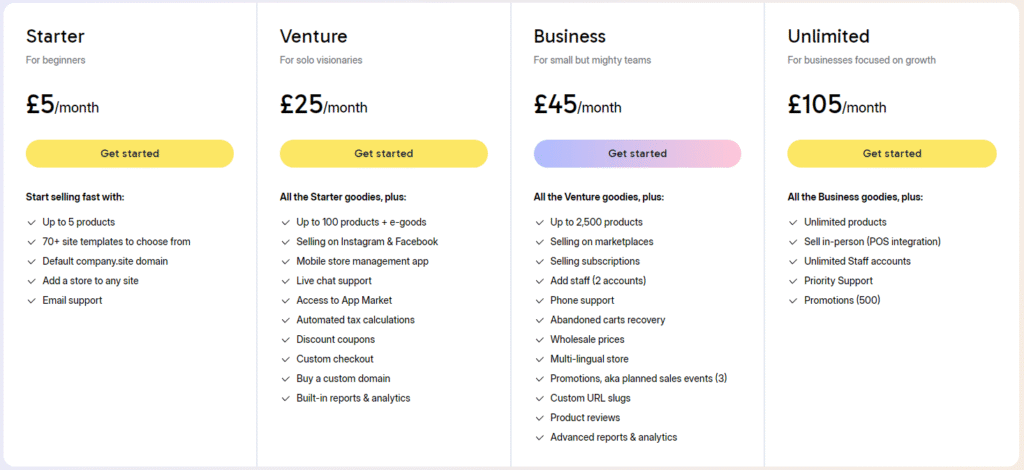
Starter
Price: £5/month
- Features: 0% transaction fees, add a store to any website, sub-domain, 70+ templates, site builder, social media advertising, tax invoices, mobile optimized shopping cart, list up to 5 items, unlimited bandwidth, GDPR compliance, and email customer support.
- Best for: testing products or small side-gigs.
Venture
Price: £25/month
Saving: 16%
- Features: everything in the Starter plan, plus: list 100 products, selling on social media, app market, custom checkout, connect custom domain, mobile store management app, discount codes, auto tax calculations, pre-orders, built-in reports, analytics, inventory tracking and live chat support.
- Best for: selling across social channels.
Business
Price: £25/month
Saving: 22%
- Features: all Venture plan tools as well as 2,500 items, 2 users, sell on marketplaces, abandoned carts recovery, product reviews, custom URL slugs, sell subscriptions, promotions, advances reports & analytics, multi-lingual store, wholesale prices and phone support.
- Best for: multichannel sales expansion.
Unlimited
Price: £105/month
Saving: 19%
- Features: all features from the Business plan, plus: unlimited products, sell in-person (POS integration), unlimited user accounts, up to 500 promotions, and priority support.
- Best for: high-growth or established businesses.
Ecommerce Website Builder Companies: Conclusion
Finding the right platform from today’s best ecommerce website builder companies ultimately depends on your goals, budget, and technical skill level.
Whether you’re launching a digital product, running a physical goods store, or scaling a fast-growing brand, there’s a solution tailored to your needs.
- Shopify is ideal for full-scale operations and high-growth e-commerce businesses.
- Wix and Squarespace balance creative control with simplicity for design-conscious sellers.
- Hostinger and Sellfy cater to beginners, solopreneurs, and creators with smaller budgets.
- Webflow, ShopWired, and Ecwid shine for their flexibility, integrations, and global capabilities.
- For open-source freedom, PrestaShop gives European businesses and developers robust customization options.
The key takeaway?
Start with your online store’s needs.
Then match it with an ecommerce store builder that supports your current and long-term vision.
Most of these platforms offer low-cost entry points, so you can test the tools, interface, and features right away.
Disclaimer: This article contains affiliate links. If you sign up for a paid plan through my links, I may receive small compensation at no cost to you. You can read my affiliate disclosure by going to my privacy policy. This blog is for informational purposes only and does not constitute financial advice.
Best Ecommerce Website Builder Companies: FAQs
Here you can find the answers to the most frequently asked questions in relation to the best website builders.
Q: How much does an ecommerce website builder cost?

A: The cost of the best ecommerce website builder companies can vary widely depending on the platform, features, and scale of your business.
Here’s a general breakdown to help you understand what to expect:
1. Entry-Level Plans ($5 to $25/month)
- Best for: Beginners, hobbyists, and small businesses with limited product ranges.
- Includes: Basic store setup, product listings, a simple website, limited bandwidth and storage.
Examples:
Wix Ecommerce Lite Plan ($17/month)
Sellfy Starter ($19/month)
2. Mid-Tier Plans ($25 to $79/month)
- Best for: Growing businesses that need more features and integrations.
- Includes: More advanced themes, custom domains, abandoned cart recovery, multichannel selling, and basic marketing tools.
Examples:
Shopify Basic Plan ($39/month)
Squarespace Commerce Basic ($27/month)
Hostinger Business Website Builder ($3.99/month)
3. Advanced Plans ($79 to $299/month)
- Best for: Scaling brands, high-volume sellers, and multi-location businesses.
- Includes: Advanced analytics, lower transaction fees, more admin users, shipping discounts, and integrations with CRM/ERP systems.
Examples:
Shopify Advanced ($399/month)
Webflow Plus ($74/month)
4. Enterprise Plans ($500+/month or custom pricing)
- Best for: Large enterprises, B2B sellers, or businesses needing tailored infrastructure.
- Includes: Unlimited sales, API access, dedicated support, uptime SLAs, and headless ecommerce options.
Examples:
Shopify Plus (Starts at $2,300/month)
Volusion Prime (Custom pricing)
Tips On How To Save The Most:
Annual billing often provides up to 25–30% savings compared to monthly billing.
Look out for seasonal discounts, free trials, and start-up incentives.
Some platforms like Wix and Hostinger include domain and hosting for free in their plans.
Q: Can I build e-commerce website on my own?
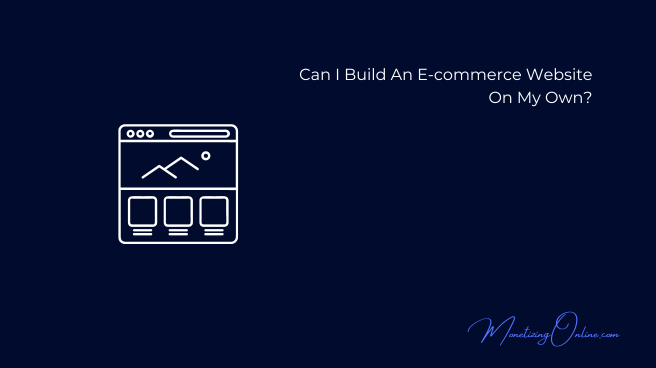
A: Yes, you can absolutely build an e-commerce website on your own and it’s easier than ever thanks to modern ecommerce website builder companies that offer intuitive, no-code tools.
Here’s what makes it possible:
1. No Coding Required
Platforms like Shopify, Wix, and Squarespace offer drag-and-drop builders, pre-designed templates, and built-in store features.
You don’t need to know HTML, CSS, or any backend programming.
2. Step-By-Step Wizards
Most builders include guided setup for:
- Adding products.
- Setting prices.
- Choosing payment gateways (PayPal, Stripe).
- Configuring shipping and tax.
- Publishing your store live.
3. AI-Powered Help
Some ecommerce platforms now include AI design assistants, auto product descriptions, and smart layout suggestions, reducing time and guesswork.
4. Templates Built For Selling
Whether you’re selling clothing, digital downloads, or handmade crafts, you can choose from hundreds of ecommerce-specific themes and customize them to your brand.
5. Built-In Hosting And Security
No need to manage web hosting or install security certificates, platforms like Shopify and Squarespace handle that for you.
What You’ll Still Need To Do:
- Choose a domain name.
- Create your product images and descriptions.
- Set up payment and shipping.
- Launch your store and promote it online.
Pick one of the ecommerce website builder companies and test its capabilities.
You’ll be surprised how quickly your store comes together.
Q: Which website builder is best for small business?
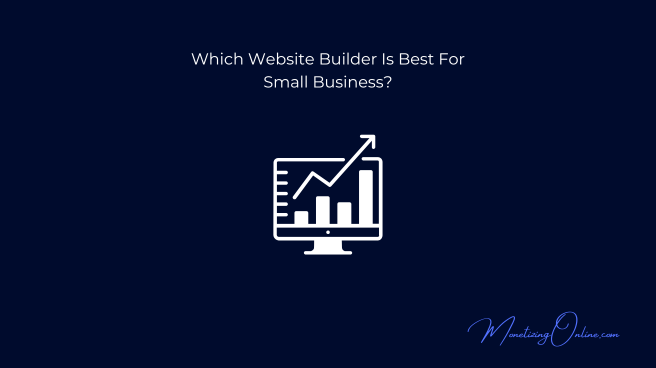
A: When it comes to choosing the best option ecommerce website builder for small businesses, the right platform balances affordability, ease of use, and scalability.
Top Pick: Shopify
Why it’s best: Shopify offers a powerful combination of simplicity and growth potential.
Even its Basic plan includes everything small businesses need: unlimited products, secure checkout, multi-channel selling (Facebook, Instagram, TikTok, Amazon), and excellent customer support.
Who it’s for: Small businesses ready to sell online seriously and scale over time.
Other Strong Options:
1. Wix E-commerce
Best for: Small businesses that want more creative control and flexibility in design.
Highlights: Intuitive drag-and-drop editor, stylish templates, and a wide feature set for product display and promotions.
2. Squarespace Commerce
Best for: Small brands with a strong focus on visual storytelling and design.
Highlights: Sleek templates, built-in marketing tools, and a great user experience.
3. Sellfy
Best for: Creators selling digital products, subscriptions, or print-on-demand items.
Highlights: Fast setup, no coding, built-in marketing tools, perfect for solopreneurs or small teams.
4. Hostinger Website Builder
Best for: Budget-conscious startups.
Highlights: Affordable pricing, built-in AI tools, and essential ecommerce functionality in one simple package.
5. Squarespace Commerce
Best for: Small brands with a strong focus on visual storytelling and design.
Highlights: Sleek templates, built-in marketing tools, and a great user experience.
Q: What is the cheapest e-commerce website builder?
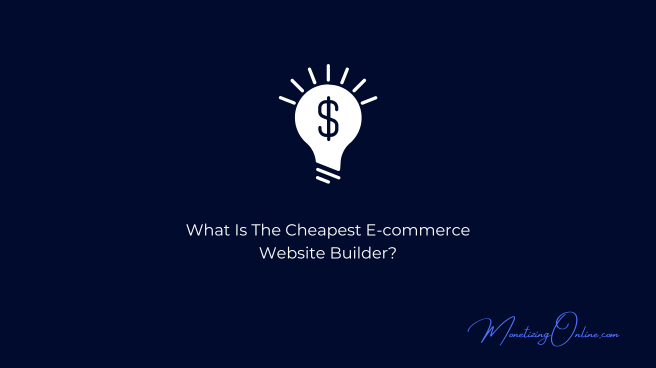
A: When it comes to affordability, Hostinger stands out as one of the cheapest ecommerce website builder companies available today.
With pricing starting as low as $2.99/month (billed annually), Hostinger’s website builder offers a cost-effective solution for individuals and small businesses looking to sell online without breaking the bank.
Despite its budget-friendly pricing, it includes essential ecommerce features like product catalogue management, payment gateway integration, mobile optimization, AI tools, and marketing options like email campaigns and SEO settings.
Hostinger’s e-commerce plans also come with free domain registration, an SSL certificate, and fast cloud hosting, giving users solid performance at minimal cost.
For startups, side hustles, or businesses just beginning to test e-commerce, Hostinger offers a surprisingly robust package, proving that low price doesn’t have to mean limited functionality.
Other low-cost ecommerce website builder companies include:
- Wix ecommerce – starting from $9/month when billed annually.
- Ecwid – starting from £5/month when billed annually.
- Squarespace – starting from $16/month when billed annually.
Q: How much does Shopify take from a $100 sale?
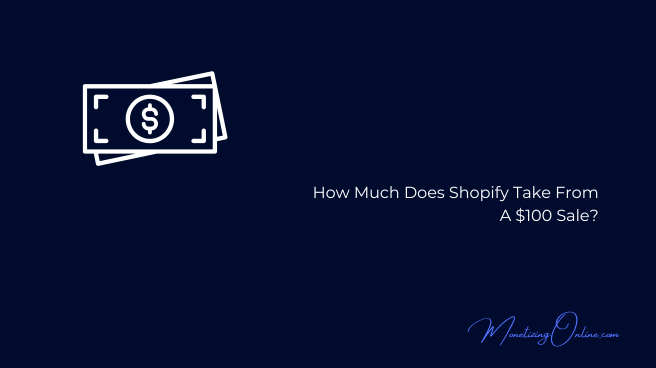
A: How much Shopify takes from a $100 sale depends on your plan and which payment processor you use.
Here’s a breakdown assuming you’re using Shopify Payments (Shopify’s built-in payment processor):
Transaction Fees With Shopify Payments
If you’re using Shopify Payments, Shopify doesn’t charge additional transaction fees, but you’ll still pay credit card processing fees:
Basic Plan ($19/month):
2% + $0.25 per transaction
On a $100 sale:
- 2% of $100 = $2.00
- Plus $0.25 = $2.25 total
- You keep: $97.75
Grow ($49/month):
1.7% + $0.25 per transaction
On a $100 sale:
- 7% of $100 = $1.70
- Plus $0.25 ¢ = $1.95 total
- You keep: $98.05
Advanced Plan ($259/month):
1.5% + $0.25 per transaction
On a $100 sale:
- 5% of $100 = $1.50
- Plus $0.25 = $1.75 total
- You keep: $98.25
If you use a third-party payment gateway
Shopify adds an extra transaction fee on top of what your gateway charges:
So for a $100 sale using a third-party gateway on the Basic plan, you might lose $2 (Shopify fee) + whatever your gateway charges.
Ecommerce Website Builder Companies: Recommended Articles
Looking to explore further?
Check out these recommended articles on MonetizingOnline.com to deepen your knowledge on ecommerce website builder companies and grow your online business with confidence.





